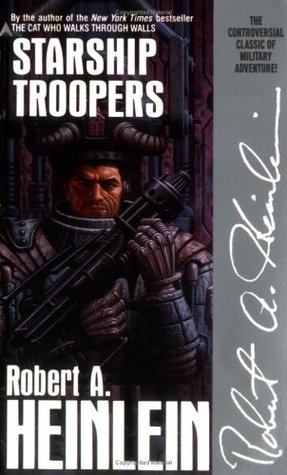Starship Troopers was first published in 1959. It subsequently was awarded the Hugo for best novel, and some would argue it’s Heinlein’s best-known work. It also, extremely more subsequently, was adapted into a film. In recent decades the film has overshadowed the book.

The book deals with themes of war, maturity, equality, the franchise, discipline, and some would argue fascism.
It’s structured as a sort of wanderjahr but during an interstellar war. This is interspersed with introspective scenes where the character narrates, in the first person, his boot camp experience, as well as subsequent cadet experience. In fact, for a book about starship troopers and powered armor and combat, it’s mostly about school, either in the form of boot camp or the cadet academy. While the book has been praised for it’s depictions of combat, it’s also somewhat lacking in actual combat. The first chapter shows a drop and a battle against the humanoids, also referred to somewhat derisively as the skinnies. The other enemy of the book is the bugs or arachnids. Actual descriptions of the enemy are scarce – we know they are the enemy, but they remain essentially faceless. The terms arachnids and bugs will typically evoke some disgust or unpleasant emotion in most readers, but there’s none of the descriptions you might expect of monsters being fought by brave servicemen.
The prose is workmanlike, almost a newspaper-like reporting of life with little poetry or, as I’ve alluded there’s nothing fantastic or even horrifying about the putative enemies.
“Those first six weeks were all hardening up and hazing. with lots of parade drill and lots of route march. Eventually, as files dropped out and went home or elsewhere, we reached the point where we could do fifty miles in hours on the level-which is good mileage for a good horse in case you’ve never used your legs.” Nothing really related about the difficulties of marching, the boredom or pain, no self-transformation as the character must rapidly lose weight and get in better cardiovascular condition.”
The cruelty of boot camp, the cult-like conditions, and the effective denial of identity and isolation that is reminiscent of an abusive marriage is presented as necessary, good even, and the drill sergeants, who repeatedly strike cadets are presented as dedicated and caring.
The only times the prose gains any real flavor are through references to the undisciplined masses who caused the disorders.
“Probably those Scottish veterans, since they were finding it necessary to hang some veterans, decided that, if they had to do this, they weren’t going to let any “bleedin’, profiteering, black-market, double-time-for-overtime, army-dodging, unprintable” civilians have any say about it.”
Suddenly, Heinlein lapses into repetition and piles on adjectives. The novel seems to worship violence, advocating violence for discipline and that violence is the only answer. The facelessness and the lack of any introspection about the bugs beg the question if they exist, solely as an enemy, to be an enemy. One is reminded of a quotation:
“We’ve always been at war with eastasia” (Catch-22, George Orwell).
The book purportedly examines a society where the franchise is only granted to those who engage in “federal service”. It’s unclear what this actually means, in the book, there is an intimation that it might not absolutely be required to join the military, but the books’ absolute focus on violence and the military easily, and it’s repeated disgust for those who are non-violent and invective about their weak ways and their supposed intellectuality makes it difficult to doubt the conclusion – to become a citizen, one must be willing to perform violence in the service of the state.
In and of itself the idea is an interesting one. But the book essentially fails to examine the practical, economic, and philosophical implications. In the current day the United States there has been a massive shift, the change from the Vietnam Wars draft, where anyone had the potential to become a member of the military to an “all-volunteer army” means that members of the armed forces, especially enlisted members, are disproportionately non-white and tend to be economically disadvantaged. This means that the grueling conditions of basic training are often faced directly out of high school for people who lack the means to attend college. The imprinting effect of basic training and isolation is far more comprehensive for these service members. In contrast, members of the upper classes who do choose to join the military overwhelmingly do so as members of the privileged officer class, generally meaning they attend college first, and thus are 4-years older when they finally join with more fully formed personalities. Some have argued that the “all-volunteer” status of the current US military has in part enabled the US to engage in endless wars in the middle east, since the sons (and daughters) of privileged members of society are not forced to fight, the human cost is only born, effectively, by the poor. Others have argued that the current nature of the US economy is such that most enlistees are not volunteers, but rather coerced by lack of economic opportunity, and forced to risk their lives in the hopes of a better life through attaining a college degree.
In any case, the novel doesn’t really do much with this theme, simply referring to it as a good thing that only individuals who serve receive the franchise.
The book’s lack of worldbuilding and explanation leaves the question ambiguous, how would a society, based on violence, function without violence as an outlet and excuse? Would internal dissension break down the Terran Federation without an enemy? We can speculate as to the true nature of the war with the bugs, whose sins are not explicated and seem to have little to gain from the war.
Paul Verhoven’s adaptation satirizes some of the salient points of the novel excellently. The movie follows the same protagonist rapidly through the end of a bug battle, then returns to high school, joining the military more or less on a dare and a desire to sleep with a girl, and then through basic, and finally to another battle.
Like in the book, Rico’s “weak” successful rich father choose to join the military by the end and acknowledges the superiority of Rico’s choice to join the military, and ends up under his command.
One of the things I find interesting about this novel is how it seemingly opened the door for authors to use science-fiction as a place to declaim about their political, economic, and philosophical views. I am actually a big fan of Frank Herbert and the Dune novels (explicitly including the sequels, yes, all of them) but I do find it almost laughable how often the dialog or scenes are set up to transparently allow the author to lecture the reader by using a straw-man character.
On it’s own merits, I don’t think Starship Troopers is a particularly great book, but it’s enormously influential, and rather short, so in some sense worth reading as a book that influenced other books. I think it’s definitely worth reading and following it up with the film, for a better understanding of the genesis of the military worship that seems to infect much of science fiction directly following the end of the golden age.

